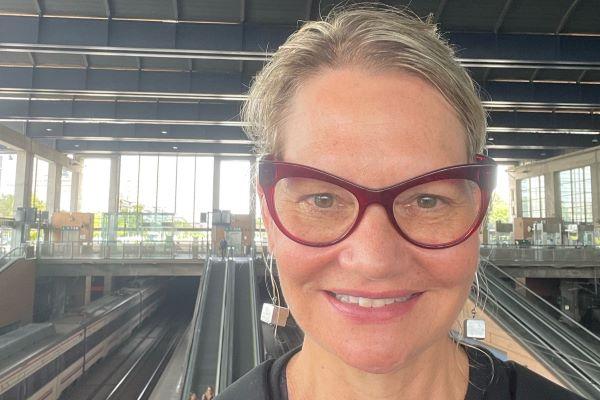July 2025 CSEEES Alumni Profile: Larissa Abramiuk

Larissa Abramiuk, MA in Slavic and East European Studies, Class of 1998
Where do you work and what is your current position?
I recently returned from Ukraine after two and a half years working as a Field Monitoring Specialist contractor for USAID. Now that I’m back in the States, I’ll be joining the contractor’s (GEG) surge team. Before Ukraine, I served as a long-term election monitor in Bosnia and Herzegovina for the elections. In Ukraine, I had the honor of being the only American on a team of Ukrainian colleagues. Much of my work involved traveling to regions devastated by Russian aggression to observe the activities of USAID-funded humanitarian partners. This meant conducting interviews with aid recipients, UN and NGO staff, local officials, police, and government representatives about their experiences with the assistance.
Tell us how you got there.
A lot of it came down to timing, persistence, and luck. I have a broad range of interests: the arts and culture, history and politics—especially human rights and democratization. These interests date back to my undergraduate days, when I first began studying this part of the world in depth.
Not long after undergrad, (where I majored in Central and East European Affairs), I got my first job at the U.S. Embassy in Moscow, where I interviewed individuals (for refugee/asylum status) from across the former Soviet Republics who had faced religious persecution. Later, after completing my MA at Ohio State, the same contractor I worked for at the embassy started filling roles at the Organization for Security and Cooperation in Europe (OSCE), including election monitoring and longer-term assignments known as secondments. That’s how I began working on election missions in the Balkans (Bosnia), Ukraine and Belarus.
When Russia launched its full-scale invasion of Ukraine, I felt an immediate pull—I knew I had to go and contribute however I could. Otherwise, what was all that experience and education for? The writing had been on the wall since 2014, when Russia first invaded. I had already observed elections in Ukraine around both the Orange Revolution and the Maidan Revolution periods, so I knew the context well.
Then, serendipitously, a job posting came up with that same contractor. I applied, but within just a few days (which almost never happens) I got a personal email and a phone call from their recruiter. I suspect they looked me up internally and saw I had the experience and both Ukrainian and Russian language skills, because the outreach came before my online application could be fully processed. Within a few weeks I was on my way to Ukraine.
What was your focus or research interest when you studied at Ohio State?
The CSEEES program at Ohio State was very supportive of my interest in Ukrainian Modernism and gave me the flexibility to collaborate across departments, particularly with the History of Art faculty. I was fortunate to work closely with Dr. Myroslava Mudrak, a leading scholar of the Ukrainian and Russian avant-garde. Her mentorship shaped my thesis on filmmaker Oleksandr Dovzhenko, where I explored both aesthetic and narrative techniques in his films and his use of the Ukrainian Baroque. Mudrak’s help extended well beyond my thesis; she remained a mentor after graduation, offering guidance on job opportunities and references that have helped shape certain decisions I made along my post-graduate path.
How have your language skills helped you in your career?
I have studied a few Slavic languages in addition to Ukrainian (Russian, Bosnian, and some Polish). All of my field interviews for work were conducted in Ukrainian; I used English only with UN expatriates and some of my Ukrainian colleagues. Speaking it was not only appropriate but necessary, especially when engaging with traumatized individuals—some of whom had survived Russian filtration camps where any “Ukrainianness” was punished brutally. People thanked me for knowing the language; it helped build trust, show respect, and strengthen relationships. My friends and colleagues thought it was “kruto” (cool); it opened doors, and deepened connections.
If you are a traveler, what is one of your favorite trips you have taken?
I love to travel and am up for trying just about anything, especially if it involves horses. One of my favorite experiences was horseback riding from the Giza pyramids to Saqqara and back in Egypt. More recently, through my work, I had the chance to explore Sarajevo in depth during my mission and spent a lot of time in the old Turkish quarter called Baščaršija enjoying Bosnian food and Turkish coffee.
What are your future plans?
I will go back to Ukraine in the near future either with the GEG surge team or in a different capacity. I definitely see myself there to help out wherever I can as the war tragically continues, and afterwards when reconstruction begins.
What inspires you?
What inspires me most are the resilient people I have met in the face of war. My recent work changed my life completely. Working alongside colleagues and friends in some of the hardest-hit areas—often with Shahed drones and ballistic missiles flying overhead—has redefined what resilience means to me. If the night was spent sleepless in a bombshelter, Ukrainians don’t miss a beat the next morning. They go to work, cook for their families—unless there is a power outage, which they’re prepared for—and just keep moving forward. After a major Russian missile strike, the cleanup crews are out as soon as evidence is collected, clearing debris and rebuilding whatever they can.
One of my colleagues is from Kharkiv and told me that during a missile strike (one of many, with varying distance and impact) his neighbor was outside planting roses. Over time, people begin to adapt, learning to gauge the threat by sound and proximity. That kind of quiet defiance and insistence on living with dignity no matter the circumstances, is what inspires me.
